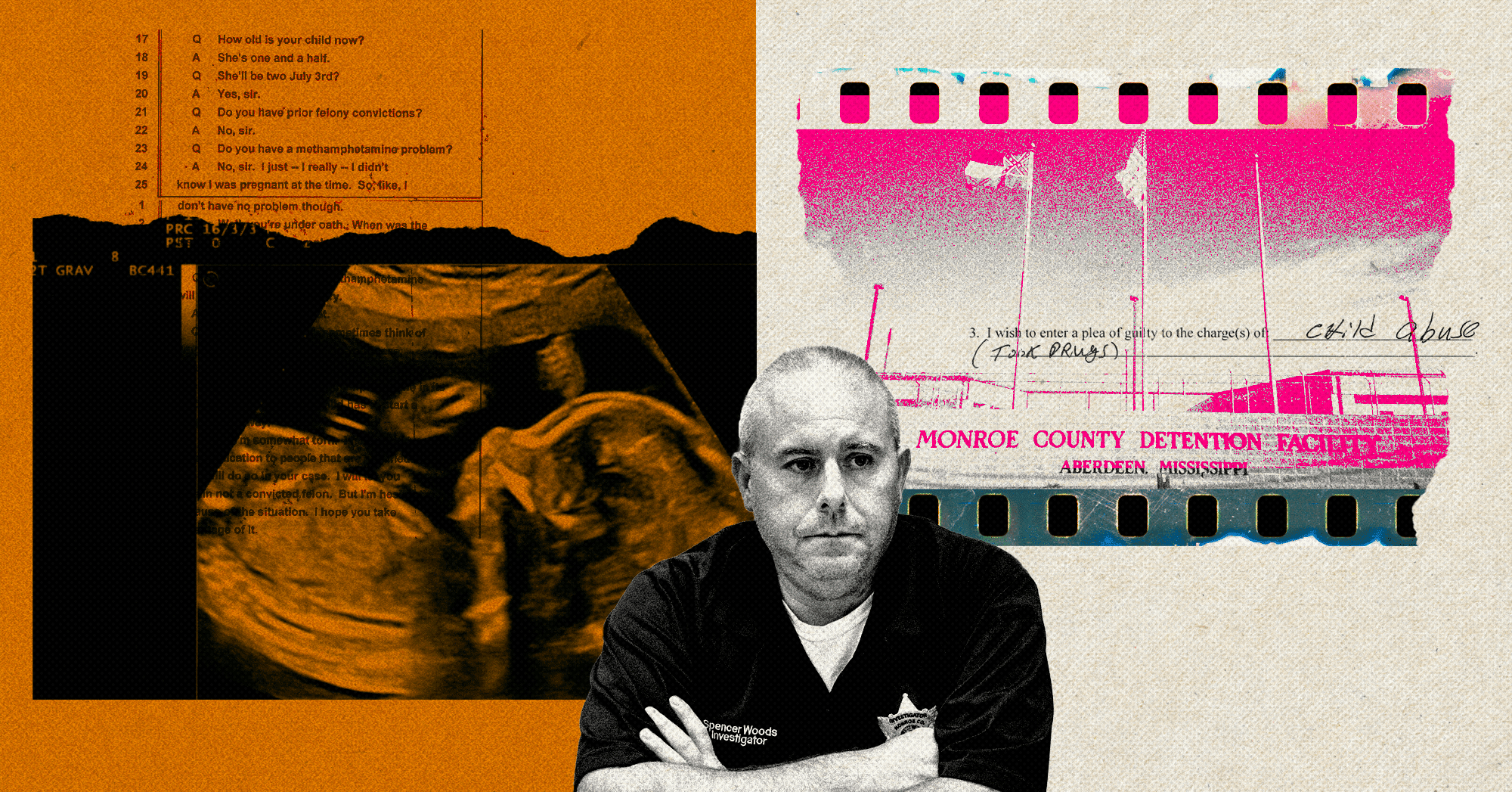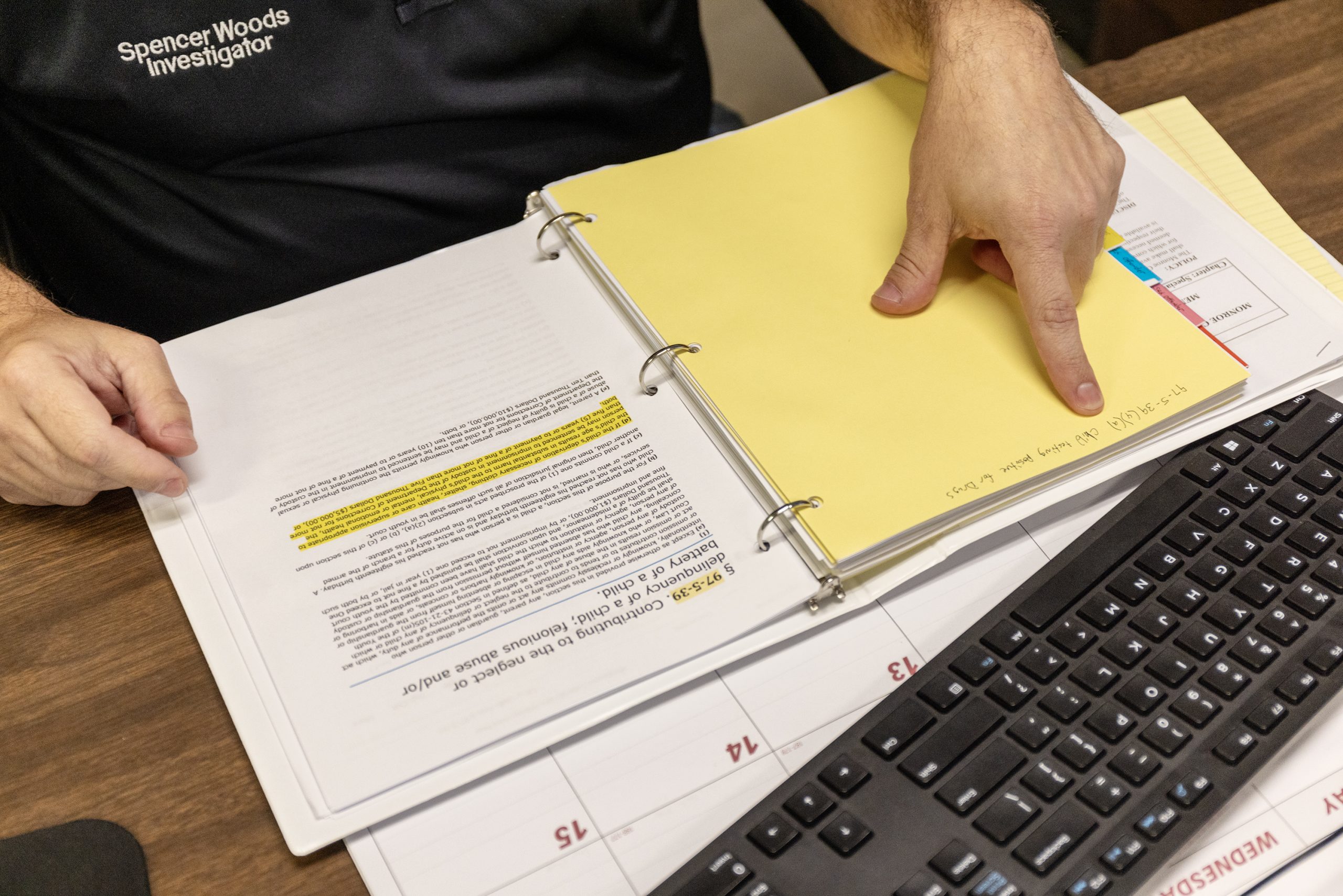Mississippi Today
They Were Prosecuted for Using Drugs While Pregnant. But It May Not Have Been a Crime

This article was published in partnership with The Marshall Project, a nonprofit news organization covering the U.S. criminal justice system. Sign up for their newsletters, and follow them on Instagram, TikTok, Reddit and Facebook.
Spencer Woods wanted to fight a crime that didn't exist.
As a sheriff's investigator in Monroe County, Mississippi, near the Alabama border, he would occasionally receive reports from his state's child protection agency that a baby had tested positive for illegal drugs at birth.
To Woods, the mothers had endangered their fetuses and should face criminal charges. But unlike some other southern states, Mississippi law doesn't define a fetus as a person; in fact, voters had rejected a ballot measure to do just that more than a decade ago.
So when Woods would receive these referrals, he had to effectively place them in the trash.
“We were coming across those type [of] things that I considered to be child abuse, but as far as the statute, the state wasn't recognizing that as actual child abuse,” Woods said in an interview.
That's until 2019, when Woods decided that his office would take matters into its own hands and pursue child endangerment cases against the women anyway. He argued that child abuse can, in fact, take place inside the womb, challenging anyone to prove otherwise.
Through news reports and court records, Mississippi Today identified 44 cases in which law enforcement officers in Mississippi have arrested women for a crime that, based on existing state law, they may not have actually committed.
“The state of Mississippi does not look at a child as being a child until it draws its first breath,” Woods said. “Well, when that child tests positive when it's born, the abuse has already happened, and it didn't happen to a ‘child.' So it was a crack in the system, the way I looked at it. And that's where we're kind of playing.”
While medical experts warn against drug use during pregnancy, they point out that not all babies exposed to drugs in the womb are born with medical problems. But Woods said that he doesn't need evidence of harm to the fetus — just a positive drug test — to pursue a child endangerment case.
Monroe County has accounted for 12 of the 44 cases we found. Woods said he was unaware that 200 miles to the south of his jurisdiction, officials in Jones County had already been filing similar charges against mothers for years, Mississippi Today reported in 2019. All but three of the cases Mississippi Today identified from 2015 to 2023 came from Monroe and Jones, two small rural counties.
While Monroe County has offered leniency in keeping these women out of prison, Jones County's lone judge, Circuit Court Judge Dal Williamson, has given at least six women long prison sentences for using drugs while pregnant. The difference in sentencing stems in part from the counties charging women under different sections of the child abuse law. Monroe County has utilized the child endangerment section that bars parents from allowing their children to be present around drugs, such as in meth labs. Meanwhile, Jones County has charged women in similar circumstances with poisoning their fetuses. Williamson ordered the women to serve between two and 15 years in prison.
“I don't understand how in the world a mother expecting a child would continue to pour this poison in their body,” Williamson said at a sentencing last year, according to the local newspaper Laurel Leader-Call. “Your baby can't say, ‘No, mama, stop.'”
Some local investigators and prosecutors are pursuing similar cases in Alabama, Oklahoma and South Carolina. They are policing pregnant people under an expanded interpretation of child abuse and neglect laws — even if parents birthed healthy babies, according to an investigation by The Marshall Project, Mississippi Today, AL.com, The Frontier and The Post & Courier.
Officials in Etowah County, Alabama, 185 miles to the east of Woods, are perhaps the champions of this approach, having arrested hundreds of women in the past several years.
Woods' strategy has never been tested in court, because each of the 12 women his office has arrested have pleaded guilty under diversion or probation deals that keep them out of prison.
Defense lawyers said they would like to take a case to trial, but their clients are reluctant. “They're not wanting to take that risk of going to trial and getting convicted because they're all fighting to get their kids back,” said Luanne Thompson, one of two public defenders in Monroe County who has handled these cases. “That is the dilemma that they're in.”
Most of Thompson's clients have received “non-adjudicated” sentences, meaning they avoid prison and their records will be cleared if they satisfy the terms of their probation.
Public health experts fear that the threat of prosecution could dissuade pregnant people from seeking prenatal care at a time when the state is facing growing threats to the health of newborns. Mississippi has the highest infant mortality rate in the nation, at roughly 9 deaths per 1,000 live births.
Cases of infant hospitalizations in Mississippi related to drug exposure in the womb have skyrocketed from more than 300 cases in 2015, when Jones County began prosecuting these cases, to four times that in 2021, at a high of more than 1,200.
State Health Officer Daniel Edney has vowed to address these issues. His department compiled a recent report that identified the uptick in drug-exposed newborns. The report blamed the increase on changes in diagnostic coding at hospitals, as well as rising substance abuse due to the isolation and reduced access to therapy people experienced during the coronavirus pandemic.
But Edney, a longtime addiction specialist, was shocked to learn from recent reporting by The Marshall Project and Mississippi Today about local prosecutions of mothers not unlike his own patients.
“I thought, ‘This is archaic,'” Edney said. “There are a lot of medical conditions that if a pregnant mom doesn't take care of herself, it hurts the baby. This is the one disease that we'll incarcerate a woman for.”
He warns that prosecuting moms with substance use disorders as child abusers will only deter them from seeking care, making it harder for the medical community to do its job.
“We don't need law enforcement going in to arrest women who are trying to get help,” Edney said. “It has a chilling effect on the women out there who are trying to decide what they need to do.”
Though Mississippi officials enacted and defended the state abortion prohibition that ultimately led to the U.S. Supreme Court overturning Roe v. Wade last year, the state does not recognize “fetal personhood.” In 2011, Mississippi voters rejected an amendment to the state constitution proposed by anti-abortion activists that would have defined a fertilized egg as a person.
The Mississippi Supreme Court has twice taken up the issue — through two cases in which local officers charged women with murder or manslaughter after losing their pregnancies in 2006 and 2009. Both times, justices wrote ambiguous opinions, and the lower courts ultimately threw charges out in both cases.
Mississippi's abortion prohibition doesn't criminalize pregnant people, nor does it treat abortion as murder. The law stipulates prison terms only for the person who performed the abortion, not the woman who sought it. Bills filed in the Mississippi Legislature to criminalize drug use while pregnant under the state's child abuse statute have died with little attention. Despite those failed efforts, the sheriff's investigator in Monroe County decided his department needed to act.
“We're eventually gonna have to deal with possibly the Supreme Court or possibly the state Legislature on changing the law, hopefully,” Woods said.
He said he realizes that his tactic may have implications for reproductive rights.
“I always had to keep that in the back of my mind, the Roe v. Wade type stuff, what women can do with their bodies,” Woods said. “That was never my argument. My argument was always what was best for the child. I discussed it with my assistant district attorney, who is a woman, and she had my back on this, and we went forward with it.”
But a growing body of research shows that what's best for the health of newborns is critical bonding with their mother.
“We have to balance the health and safety of that baby while also trying to make sure that family stays connected,” said Dr. Anita Henderson, a Hattiesburg pediatrician and president of the Mississippi chapter of the American Academy of Pediatrics. “If you're trying to reunify families or make that mom or that family as healthy as possible, then the goal should be treatment. ... Incarceration and the threat of incarceration have proven to be ineffective.”
Christina Dent, who has cared for children in Mississippi's foster care system as a result of their mothers' drug addictions, supports the concept of fetal personhood and is personally against abortion. She's also the founder of End It For Good, a nonprofit that advocates for the legalization of drugs. Dent's group argues that criminalizing drugs only increases harm to people and society. She said that treating these mothers as criminals is “opposed to a pro-life ethic” and leads to worse outcomes for both the mother and baby.
“I would say, yes, that [fetus] is a child,” Dent said, speaking for herself and not on behalf of her organization. “And because of that, shouldn't we do everything possible to protect that child from further harm, help the mother access prenatal care, and protect the bond of this little family?”
Monroe County Sheriff Kevin Crook has earned a reputation for taking a compassionate approach to drug offenses, placing an emphasis on treatment and rehabilitation. In Crook's view, though, the threat of prison motivates people to take recovery seriously.
“We gotta have something for these people to run into,” Crook said, “or they're not just gonna stop on their own.”
Woods agreed. “I'm not really trying to put these women in prison,” he said. “What I'm trying to do is correct the issue. We do offer counseling and rehab and those types of things.”
But the investigator acknowledged there's never enough mental health services to cover the need. He also couldn't say how effective his strategy is; he doesn't have any data to show how many mothers he's arrested have gotten clean or reunited with their children.
Woods said he also believes that smoking or drinking alcohol while pregnant — which can produce similar if not more harmful effects as controlled substances on a fetus' development — constitutes child abuse.
He's aware his approach could be applied to other activities that might endanger a fetus. “Of course, you keep going, ‘You're eating too much sugar. You're ingesting too much caffeine.' Where do you stop with it?” Woods said.
He draws the line at illegal substances. “I have to go by statutes,” he said. “I can't just decide what I want to.”
This article first appeared on Mississippi Today and is republished here under a Creative Commons license.
Mississippi Today
Read Mississippi Today’s Pulitzer Prize finalist series ‘’Unfettered Power: Mississippi Sheriffs”

Mississippi Today's “Unfettered Power: Mississippi Sheriffs” investigation has been named a finalist for the 2024 Pulitzer Prize for Local Reporting.
The 2023 investigation from the Mississippi Center for Investigative Reporting at Mississippi Today and The New York Times' Local Investigations Fellowship revealed how Mississippi sheriffs rule like kings, wielding vast power, exploiting and abusing the very people they are called to protect with no one stopping them.

Sign up for our free, daily newsletter and get news that holds power to account.
The seven-part 2023 series, which has continued into 2024, included new details about the Rankin County “Goon Squad.”
Click the links below to read the Pulitzer Prize-recognized series.
Sex Abuse, Beatings and an Untouchable Mississippi Sheriff
Where the Sheriff is King, These Women Say He Coerced Them Into Sex
New Evidence Raises Questions in Controversial Mississippi Law Enforcement Killing
The Sheriff, His Girlfriend and His Illegal Subpoenas
How a ‘Goon Squad' of Deputies Got Away With Years of Brutality
Days After Rankin's ‘Goon Squad' Tortured Two Men, Supervisors Gave the Sheriff a Pay Boost
Who Investigates the Sheriff? In Mississippi, Often No One.
READ MORE: The complete “Unfettered Power: Mississippi Sheriffs” series
This article first appeared on Mississippi Today and is republished here under a Creative Commons license.
Mississippi Today
Mississippi Today named 2024 Pulitzer Prize finalist for “Unfettered Power: Mississippi Sheriffs” investigation

Mississippi Today's “Unfettered Power: Mississippi Sheriffs” investigation has been named a finalist for the 2024 Pulitzer Prize for Local Reporting.
The 2023 investigation from the Mississippi Center for Investigative Reporting at Mississippi Today and The New York Times revealed how Mississippi sheriffs rule like kings, wielding vast power, exploiting and abusing the very people they are called to protect with no one stopping them.
The series included new details about the Rankin County “Goon Squad.”
“I feel so blessed to see our work investigating sheriffs in Mississippi recognized by the Pulitzer Prize Board,” investigative reporter Jerry Mitchell said. “This honor doesn't belong to us. It belongs to the people who dared to stand up and share their stories — victims of violence, sexual assault and many other abuses.”

Sign up for our free, daily newsletter and get news that holds power to account.
This is Mississippi Today's second consecutive honor from the Pulitzer Prizes. The newsroom won the 2023 Pulitzer Prize for Local Reporting for its “The Backchannel” investigation into key players in the welfare scandal, making it the seventh Mississippi news outlet to win in the history of the prizes.
“This series shocked the conscience of Mississippi, and the impact this group of incredible journalists had is enormous,” said Adam Ganucheau, Mississippi Today's editor-in-chief. “Anyone who has read the stories can see how much time and energy they put into serving the state, and they are so deserving of this recognition.”
READ MORE: The complete “Unfettered Power: Mississippi Sheriffs” series
The seven-part “Unfettered Power” series documented in vivid detail the stunning abuse of residents by officers across Mississippi for more than two decades. Officers spied on and tortured suspects and used their power to jail and punish political enemies.
The reporting was based on difficult-to-get interviews and a deep examination of records, including thousands of pages of Taser logs. Using other department records, the reporting team determined which device was assigned to each deputy, allowing reporters to substantiate allegations of torture by victims and witnesses.
“None of this would have happened without the hard work of our three tremendously talented investigative reporters, Ilyssa Daly, Brian Howey and Nate Rosenfield,” Mitchell said. “They are a model for what dedication, determination and perseverance can accomplish. Because of them, we know that the future of investigative reporting is in great hands.”
The impact of the series was profound. The reporting prompted federal investigations and the drafting of several pieces of Mississippi legislation to limit the power of sheriffs.
“In a short time Mississippi Today has built a prize-winning newsroom that has produced a string of accountability stories,” said Dean Baquet, executive editor of The New York Times' Local Investigations Fellowship. “Our combined coverage of horrific abuses by sheriffs in the state is an example of the power and importance of local investigative reporting. It has yielded results, and the work continues.”
The Pulitzer Prize is the most prominent award earned by Mississippi Today, the state's flagship nonprofit newsroom that was founded in 2016. The newsroom and its journalists have won several national awards in recent years, including: two Goldsmith Prizes for Investigative Reporting; a Sidney Award for thorough coverage of the Jackson water crisis; a Collier Prize for State Government Accountability; and the John Jay/Harry Frank Guggenheim Excellence in Criminal Justice Reporting Award.
Mississippi Today and its staff have also won dozens of regional and statewide prizes, including dozens of Society of Professional Journalists Green Eyeshade Awards; several Mississippi Press Association awards for excellence, including a Bill Minor Prizes for Investigative Reporting; and the 2023 Silver Em Award at University of Mississippi.
“We as Mississippians are so fortunate to have strong investigative journalism in our state,” said Mary Margaret White, Mississippi Today CEO and Executive Director. “This level of reporting takes a great deal of focus, determination and grit. The journalists being honored today are public servants in the truest sense, catalyzing accountability and change and standing up for, and with, those whose voices are otherwise ignored.”
This is Mitchell's second time to be named a Pulitzer finalist. He was previously named a finalist in 2006 for his relentless reporting on the successful conviction of Edgar Ray Killen, who orchestrated the killing of three civil rights workers in Philadelphia in 1964.
The ongoing work on the sheriffs series is far from done, he said.
“We've just begun to shine a light into the darkness in Mississippi, and we can already see the roaches scattering,” Mitchell said.
This article first appeared on Mississippi Today and is republished here under a Creative Commons license.
Did you miss our previous article…
https://www.biloxinewsevents.com/?p=355987
Mississippi Today
Could Spencer Rattler be Saints quarterback of the future? Archie Manning thinks so.
Probably the biggest surprise in the recent NFL Draft came in the fifth round when the New Orleans Saints, who just last year signed veteran quarterback Derek Carr to a four-year, $150 million contract, chose South Carolina quarterback Spencer Rattler.

The Saints hadn't been expected to take a quarterback. Rattler had been expected to go much higher.
At least one expert, a former New Orleans Saints quarterback and a Mississippi legend, believes the drafting of Rattler was a wise choice by his hometown team.
“I like Spencer,” Archie Manning said recently. “I like him as a person and as a player. I can't wait to see what he does for the Saints.”
Rattler, an Arizona native, played college ball first at Oklahoma and then for the past two seasons at South Carolina. Manning knows Rattler best from when he was a counselor at the Manning Passing Academy the summer between Oklahoma and South Carolina.
“I really enjoyed Spencer at our camp,” Manning said. “His attitude was great. He worked hard, got along great with all the other quarterbacks and the campers. At our meeting to start every day, he always came in early, sat front and center and just seemed to soak everything in. He had a maturity about him. He wanted to learn. He just had this little gleam in his eye. Obviously, he can really throw the football.”
Manning, who counts South Carolina coach Shane Beamer as a friend, watched Rattler for the past two seasons, even visiting Columbia for practices and attending quarterback meetings.

“I just couldn't be any more impressed with how Spencer handled things, including some disappointments,” Manning said. “I think he has a bright future in the NFL.”
There are several knocks on Rattler that might have caused him to fall in the draft. For one, he stands just a shade over six feet tall and he is not particularly fleet of foot. That will bother some teams a lot more than it should bother the Saints, who were led to their only Super Bowl championship by a six-foot quarterback with average speed named Drew Brees.
Also, there was the transfer from Oklahoma to South Carolina after Rattler lost the starting quarterback job to Caleb Williams (the first pick of the 2024 draft). And there have been reports that an unflattering 2019 Netflix documentary, filmed during Rattler's senior year of high school when he was the nation's No. 1 quarterback recruit, caused some NFL teams to lower their evaluations. Said Manning, “I haven't seen that documentary but I've heard about it. All I know about his attitude and makeup is what I've seen first-hand.”
Clearly, Rattler has some upside. At Oklahoma and South Carolina combined, Rattler threw for over 10,800 yards, 77 touchdowns and 32 interceptions with a 68.5% completion rate. As a junior at South Carolina, he led the Gamecocks to eight victories including back-to-back wins over No. 5 Tennessee and No. 8 Clemson. He threw for 438 yards and six touchdowns against the Vols, 360 yards and two TDs against Clemson. Then, in the Gator Bowl against Notre Dame, he threw for 360 yards and two scores.
Last season, when South Carolina replaced much of its offensive line, Rattler was sacked 30 times but still threw for 3,196 yards and 19 touchdowns and only eight interceptions. Rattler was outstanding in the Senior Bowl, winning MVP honors.
A cynic might joke that the 30 sacks will be excellent preparation for the Saints, who hope to have solved some of their pass-blocking woes by taking Oregon State offensive tackle Taliese Fuaga with their first round choice. Fuaga did not allow a sack his entire senior season.
Rattler is expected to battle Nathan Peterman and Jake Haener for the back-up role behind Carr this preseason. Many, including Manning, believe he could project as a long-range starter down the road.
It has been amazing to watch the devaluation of the running back position in the NFL over recent seasons. Not a single running back was selected in the first round in the 2024 draft. Texas halfback Jonathan Brooks was the first back taken with the 14th pick of the second round, the 46th pick of the draft. Greenville native Trey Benson was the second running back taken (by the Arizona Cardinals) with the second pick of the third round. And get this: Benson's high school teammate Dillon Johnson, the Washington Huskies running star, wasn't taken in the draft at all.
Johnson, who runs with both power and speed, ran for 1,195 yards and 16 touchdowns, helping the Huskies to the national championship game despite a broken bone his right foot, a sprained left ankle and a ruptured bursa sac in his left knee. Seems to me the steal of the 2024 draft might be someone who wasn't drafted at all. Also seems to me those injuries to Johnson are an indication of why running backs are not valued as highly as was once the case. The shelf life of NFL running backs is not particularly long.
This article first appeared on Mississippi Today and is republished here under a Creative Commons license.
-
SuperTalk FM4 days ago
Driver’s education set to become mandatory in Mississippi as bill passes
-
SuperTalk FM3 days ago
State approves $160M to expand Highway 7 to four lanes in Lafayette County
-
Mississippi Business6 days ago
Geartek expanding operations in Alcorn County
-
Mississippi News6 days ago
Two women accused of shoplifting across southeast captured in Mississippi
-
Mississippi News4 days ago
Altercation at Mississippi police department leads to officer-involved shooting
-
Mississippi News1 day ago
Winston Co. Sheriff’s Office investigates shooting at Dave’s Club
-
Mississippi News6 days ago
Starkville police make arrest in shooting at Dawg Wash South
-
Mississippi Today2 days ago
On this day in 1917









































